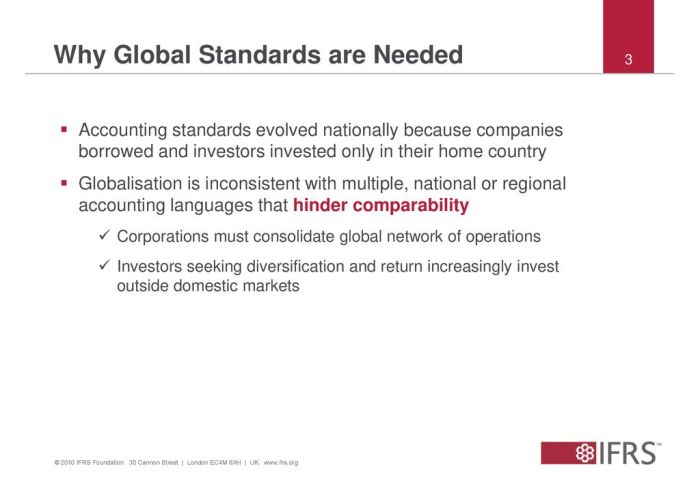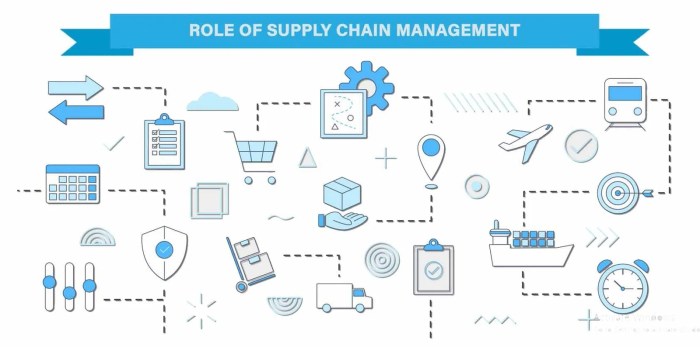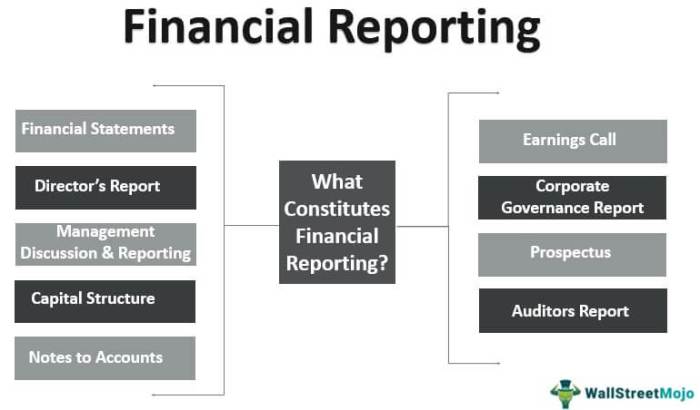How Global Stock Markets Rely on Standardized Accounting Principles is a critical examination of the interconnectedness between global finance and standardized accounting practices. The smooth functioning of international capital markets depends heavily on the ability of investors to compare and understand financial statements from companies across diverse jurisdictions. This reliance on consistent accounting methods fosters trust, facilitates cross-border investment, and ultimately contributes to a more stable and efficient global financial system. We will explore the role of key standards like IFRS, the challenges in enforcement, and the future of global accounting harmonization.
This analysis delves into the impact of International Financial Reporting Standards (IFRS) and other accounting frameworks on global stock market integration. We will compare and contrast different standards, assess their influence on investor confidence and cross-border investments, and examine the challenges of enforcing global accounting standards. Furthermore, we will explore the potential future developments in global accounting, including the role of technology and international organizations.
The Role of International Financial Reporting Standards (IFRS)
International Financial Reporting Standards (IFRS) have significantly reshaped the global landscape of accounting and finance. Their adoption has fostered greater comparability and transparency in financial reporting, impacting how global stock markets operate and how investors assess investment opportunities across borders. This increased transparency and comparability contribute to more efficient capital allocation and reduced information asymmetry.
IFRS Adoption and Global Stock Market Integration
The widespread adoption of IFRS has facilitated the integration of global stock markets. By providing a common accounting language, IFRS allows investors to more easily compare the financial performance of companies from different countries. This improved comparability reduces information costs and encourages cross-border investment, leading to more liquid and efficient capital markets. For example, the increased participation of foreign investors in emerging markets following the adoption of IFRS in those regions demonstrates this effect. Greater investor confidence in the reliability of financial statements translates directly into increased market participation and higher valuations.
Challenges of IFRS Adherence Across Jurisdictions
Despite the benefits, companies face significant challenges in adhering to IFRS across different jurisdictions. These challenges include the complexities of the standards themselves, differences in interpretation across countries, and the costs associated with implementation and compliance. Furthermore, the specific legal and regulatory environments in each jurisdiction can impact how IFRS is applied, leading to inconsistencies. For instance, a company operating in multiple countries might need to navigate varying interpretations of specific IFRS rules depending on the local regulatory landscape, leading to increased compliance burdens. The lack of uniform enforcement across all jurisdictions also presents a challenge, making it difficult to ensure consistent application of the standards globally.
Comparison of IFRS and US GAAP
IFRS and US Generally Accepted Accounting Principles (GAAP) are the two most prominent sets of accounting standards globally. While both aim to provide a fair presentation of financial information, they differ in several key aspects. These differences can influence market valuations as investors and analysts interpret financial statements differently depending on the underlying accounting framework. For example, the treatment of intangible assets or the flexibility allowed in the application of certain standards can lead to variations in reported earnings and asset values, thus affecting market perception and valuation.
| Aspect | IFRS | US GAAP |
|---|---|---|
| Inventory Valuation | Permits both FIFO and weighted-average cost methods. | Primarily uses FIFO, with LIFO allowed in certain industries. |
| Intangible Assets | Generally requires capitalization of internally generated intangible assets under specific conditions. | Generally expensed unless purchased. |
| Revenue Recognition | Uses a principles-based approach based on the transfer of control. | More rules-based, with specific guidance for various industries. |
| Goodwill Impairment | Requires an annual impairment test. | Uses a two-step impairment test. |
Impact of Standardized Accounting on Investor Confidence

Standardized accounting principles, such as those established by the International Financial Reporting Standards (IFRS), play a crucial role in fostering trust and transparency in global financial markets. Consistent financial reporting across different jurisdictions allows investors to make informed decisions, reducing uncertainty and promoting efficient capital allocation. This increased transparency directly impacts investor confidence, leading to greater participation and liquidity in global markets.
Consistent financial reporting, facilitated by standardized accounting principles, significantly enhances trust among international investors. When companies adhere to the same set of rules for preparing their financial statements, investors can readily compare the performance and financial health of businesses across different countries and industries. This comparability reduces information asymmetry, a key obstacle to efficient capital markets. The ability to accurately assess risk and return becomes significantly easier, encouraging greater investment in global markets.
The Role of Auditing Firms in Ensuring Reliable Financial Statements
Auditing firms act as independent gatekeepers, verifying the accuracy and fairness of financial statements prepared under standardized accounting principles. Their role is critical in maintaining investor confidence. Independent audits provide an assurance mechanism, mitigating the risk of fraudulent reporting or misrepresentation of financial information. The rigorous auditing process, guided by international auditing standards, ensures that companies adhere to the prescribed accounting standards and that their financial statements present a true and fair view of their financial position and performance. This independent verification significantly strengthens investor trust.
Risks to Investor Confidence from Inconsistent Accounting Practices
The absence of universally applied accounting standards poses significant risks to investor confidence. Without a common framework, investors face challenges in comparing the financial performance of companies from different jurisdictions. This lack of comparability can lead to increased uncertainty and risk aversion, potentially hindering investment flows and stifling economic growth. Inconsistent accounting practices can also lead to difficulties in assessing creditworthiness, potentially impacting lending decisions and market stability. The lack of transparency and comparability can create an uneven playing field, discouraging investment in countries or companies with less rigorous accounting standards.
Historical Examples of Accounting Inconsistencies and Market Instability
Several historical instances highlight the negative consequences of inconsistent accounting practices on market stability. The Enron scandal in the early 2000s, for example, exposed the dangers of aggressive accounting practices and lack of transparency, leading to significant market turmoil and investor losses. Similarly, the financial crisis of 2008 exposed weaknesses in accounting standards related to complex financial instruments, contributing to the widespread collapse of financial institutions and a global recession. These events underscored the importance of robust, globally accepted accounting standards in maintaining investor confidence and ensuring market stability. The lack of consistent accounting standards in these cases created significant information asymmetry, allowing companies to manipulate their financial reporting, ultimately leading to investor distrust and market instability.
Facilitating Cross-Border Investments
Standardized accounting principles, such as International Financial Reporting Standards (IFRS), play a crucial role in simplifying and enhancing cross-border investments. By creating a common language for financial reporting, these standards reduce the complexities and uncertainties inherent in international transactions, fostering greater trust and efficiency in global capital markets.
The adoption of standardized accounting practices significantly improves the transparency and comparability of financial information across different jurisdictions. This reduction in information asymmetry – the imbalance of information between investors and companies – is vital for attracting foreign investment. Investors can readily compare the financial performance of companies operating in diverse countries, making informed investment decisions based on a consistent set of reporting metrics. For instance, a US investor evaluating a potential investment in a German company can easily compare its financial statements to those of a similar company in the US, thanks to the use of IFRS. This would be considerably more difficult if each company used different accounting standards, leading to potential misinterpretations and higher investment risk.
Examples of Reduced Information Asymmetry
Standardized accounting reduces information asymmetry in several ways. Firstly, it ensures that key financial metrics, such as revenue, expenses, and profits, are calculated and presented using consistent methodologies. This eliminates the need for extensive adjustments and reconciliations, simplifying the investment analysis process. Secondly, it improves the reliability of financial information by reducing the potential for manipulation or creative accounting. Thirdly, the increased transparency fostered by standardized accounting encourages greater disclosure by companies, allowing investors to gain a more comprehensive understanding of their financial health and risk profile. This enhanced transparency reduces uncertainty and encourages greater investment.
Hypothetical Scenario Illustrating Difficulties Without Standardized Accounting
Imagine a scenario where a Japanese pension fund wants to invest in a Brazilian technology startup. Without standardized accounting, the pension fund would face significant challenges in assessing the startup’s financial performance. The Brazilian company might use accounting standards vastly different from those used in Japan, making it difficult to compare the startup’s financial statements to those of comparable companies in Japan or other countries. The fund would need to invest considerable resources in translating and reconciling the financial statements, adding to the cost and complexity of the investment. The risk of misinterpretation and inaccurate valuation would be substantially higher, potentially deterring the investment altogether. The inherent uncertainty could lead to a higher risk premium demanded by the investor, making the investment less attractive for both parties.
Benefits and Drawbacks of Standardized Accounting for Cross-Border Investment
The adoption of standardized accounting principles offers several significant advantages for cross-border investments. However, it is important to acknowledge potential drawbacks as well.
Below is a summary of these benefits and drawbacks:
| Benefits | Drawbacks |
|---|---|
| Increased transparency and comparability of financial information | Potential for increased compliance costs for companies |
| Reduced information asymmetry between investors and companies | Difficulty in adapting standards to suit specific national contexts |
| Lower investment risk and higher investor confidence | Potential for “one-size-fits-all” approach to neglect unique industry requirements |
| Improved efficiency in cross-border capital markets | Challenges in enforcement and ensuring consistent application across jurisdictions |
Challenges in Enforcing Global Accounting Standards

The widespread adoption of International Financial Reporting Standards (IFRS) aims to create a globally consistent framework for financial reporting. However, achieving truly uniform application and enforcement across diverse national contexts presents significant challenges. Differences in legal systems, economic development levels, and enforcement capabilities contribute to variations in the interpretation and implementation of these standards, ultimately impacting the reliability and comparability of financial information worldwide.
The consistent application of IFRS across countries with varying regulatory frameworks is a complex undertaking. Enforcement mechanisms, while striving for uniformity, are often tailored to specific national contexts, leading to discrepancies in their effectiveness. Furthermore, the interpretation and application of IFRS can vary significantly, depending on the specific circumstances and the judgment of local accounting professionals.
Variations in IFRS Interpretation and Application
Several factors contribute to the inconsistencies in IFRS interpretation and application. Firstly, the standards themselves, while aiming for precision, often contain areas open to interpretation, requiring professional judgment. This subjectivity can lead to different conclusions even when dealing with the same accounting issue. Secondly, the level of accounting expertise and resources available varies considerably across countries. In some jurisdictions, the lack of skilled professionals and robust accounting infrastructure can lead to inconsistencies in the application of IFRS. Thirdly, national cultural differences and business practices can influence how accounting principles are understood and applied. For example, a country with a strong emphasis on relationship-based business dealings might approach certain transactions differently than a country with a more formalized, rules-based approach. Finally, the influence of local lobbying groups and political pressures can also lead to deviations from strict IFRS adherence. For instance, a government might incentivize certain accounting practices that benefit specific industries or sectors, even if they deviate from the intended spirit of IFRS.
Enforcement Mechanisms and Their Effectiveness
Enforcement mechanisms for IFRS vary significantly across different regions. Some jurisdictions have robust regulatory bodies with significant enforcement powers, including substantial penalties for non-compliance. Others have less developed regulatory frameworks, relying more on voluntary compliance and professional self-regulation. The effectiveness of enforcement also depends on factors such as the level of resources allocated to regulatory oversight, the independence and expertise of the regulatory bodies, and the overall legal and political environment. For example, countries with strong, independent audit oversight bodies and a culture of compliance generally exhibit higher levels of IFRS adherence compared to countries lacking such mechanisms. Differences in the level of sanctions for non-compliance also significantly impact the effectiveness of enforcement. Severe penalties can act as a strong deterrent, while lenient penalties may not be sufficient to encourage consistent adherence to IFRS.
Key Obstacles to Global Standardization of Accounting Principles
The successful implementation of global accounting standards faces several significant obstacles. It is crucial to understand these obstacles to develop effective strategies for improving the consistency and reliability of financial reporting worldwide.
- Variations in Legal and Regulatory Frameworks: Different countries have diverse legal systems and regulatory environments, which can impact the interpretation and enforcement of accounting standards.
- Differences in Accounting Expertise and Resources: The availability of skilled accounting professionals and resources varies significantly across countries, impacting the quality of financial reporting.
- Cultural and Business Practice Differences: National cultures and business practices can influence how accounting principles are understood and applied, leading to inconsistencies.
- Political and Economic Influences: Political pressures and economic incentives can sometimes lead to deviations from IFRS adherence.
- Enforcement Challenges: The effectiveness of enforcement mechanisms varies across jurisdictions, impacting the level of compliance with IFRS.
- Lack of Harmonization of Tax Laws: Differences in tax laws can create inconsistencies in how certain transactions are recorded.
- Resistance to Change: Changes to established accounting practices can meet resistance from businesses and accounting professionals accustomed to existing methods.
The Future of Global Accounting Harmonization
The convergence of global accounting standards, while significantly advanced, remains a dynamic process. Technological innovations and evolving economic landscapes will continue to shape the future of how businesses report their financial performance internationally. The role of international organizations and the potential for a truly unified global accounting standard will be crucial factors in determining the success of this ongoing harmonization.
The potential for a future with a single, universally accepted accounting standard hinges on several key developments. These include the continued efforts of international standard-setters, the adoption of innovative technologies, and the willingness of nations to embrace a more standardized approach to financial reporting.
Technological Advancements and Global Accounting Standards
Blockchain technology, with its inherent transparency and immutability, presents a compelling opportunity to revolutionize global accounting. Imagine a distributed ledger system recording all financial transactions in real-time, accessible to authorized parties worldwide. This would enhance transparency, reduce the risk of fraud, and streamline the auditing process. The automation capabilities of blockchain could also significantly reduce the time and cost associated with preparing and verifying financial statements, fostering greater efficiency in global financial reporting. While challenges remain in terms of scalability and regulatory frameworks, the potential benefits of integrating blockchain into accounting practices are substantial, potentially leading to more accurate and readily auditable financial information across borders. For example, a multinational corporation could utilize blockchain to track its global supply chain transactions, automatically generating auditable records that comply with various jurisdictions’ accounting standards. This would greatly reduce the need for manual reconciliation and improve the accuracy of consolidated financial statements.
Potential Scenarios for the Evolution of Global Accounting Standards, How Global Stock Markets Rely on Standardized Accounting Principles
Over the next decade, several scenarios are plausible. One scenario could see a continued, albeit gradual, convergence toward IFRS as the dominant global standard. This would involve a greater number of countries adopting IFRS, leading to increased harmonization, but not necessarily complete uniformity. Another scenario could involve the emergence of regional accounting blocs, where groups of countries adopt similar, but not identical, standards tailored to their specific economic and regulatory contexts. A third, more radical scenario, could be the development of a truly universal accounting standard, driven by technological advancements and a growing recognition of the benefits of global uniformity. This scenario would require significant political will and international cooperation, but it holds the potential for significantly improved efficiency and transparency in global capital markets. For instance, a hypothetical scenario involving the European Union and the United States fully adopting a common, unified standard could dramatically impact global investment flows and the ease of cross-border transactions.
The Role of the IASB in Shaping the Future of Global Accounting
The International Accounting Standards Board (IASB) plays a central role in shaping the future of global accounting harmonization. Its ongoing efforts to improve and refine IFRS, alongside its engagement with national standard-setters and other stakeholders, are critical to achieving greater convergence. The IASB’s ability to adapt to technological advancements and respond to the evolving needs of global businesses will be vital in ensuring the relevance and effectiveness of IFRS in the years to come. For example, the IASB’s recent focus on incorporating sustainability reporting into financial statements reflects its responsiveness to the growing importance of environmental, social, and governance (ESG) factors in investment decisions.
A Potential Future Scenario: A Single, Universally Accepted Accounting Standard
Imagine a future where a single, universally accepted accounting standard, perhaps an enhanced and technologically advanced version of IFRS, prevails. This standard would be readily understood and applied globally, eliminating the complexities and costs associated with navigating multiple accounting frameworks. Financial statements would be easily comparable across borders, facilitating more informed investment decisions and fostering greater trust in global capital markets. Such a scenario would require significant international cooperation and a willingness to embrace a common set of principles, but the potential benefits for global economic growth and stability are substantial. This would lead to increased transparency, reduced regulatory arbitrage, and a more efficient allocation of capital resources. A global standard could also foster the development of new technologies and business models, as companies would no longer need to adapt their accounting practices to suit different jurisdictions.
Outcome Summary: How Global Stock Markets Rely On Standardized Accounting Principles

In conclusion, the global stock market’s reliance on standardized accounting principles is undeniable. While challenges remain in achieving complete harmonization and consistent enforcement, the benefits of increased transparency, investor confidence, and efficient cross-border investment are substantial. The ongoing evolution of accounting standards, driven by technological advancements and the efforts of international organizations, promises a future where a more unified and robust global financial system can thrive. The continued pursuit of improved accounting standardization will be crucial for maintaining the stability and growth of the global economy.
FAQ Overview
What are the key differences between IFRS and US GAAP?
IFRS and US GAAP differ in areas such as inventory valuation, revenue recognition, and the treatment of intangible assets. These differences can impact financial statement presentation and comparability.
How does blockchain technology potentially impact global accounting standards?
Blockchain’s potential lies in enhancing transparency and security in financial reporting, potentially streamlining the auditing process and reducing the risk of fraud.
What is the role of auditing firms in ensuring reliable financial statements?
Auditing firms play a crucial role in verifying the accuracy and reliability of financial statements prepared under standardized accounting principles, providing independent assurance to investors.
What are some examples of historical market instability caused by inconsistent accounting practices?
Examples include accounting scandals like Enron and WorldCom, which highlighted the risks of inconsistent and misleading financial reporting.
Check How to Optimize Business Cash Flow for Growth to inspect complete evaluations and testimonials from users.









